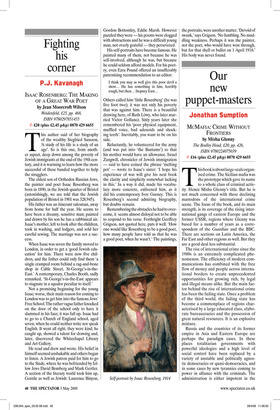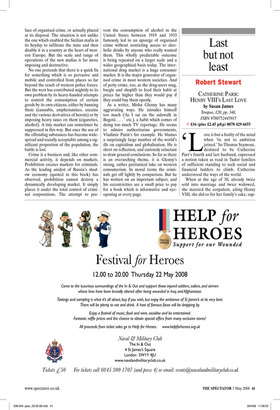Our new puppet-masters
Jonathan Sumption
MCMAFIA: CRIME WITHOUT FRONTIERS by Misha Glenny The Bodley Head, £20, pp. 426, ISBN 9780224075039 ✆ £16 (plus £2.45 p&p) 0870 429 6655 This book is about large-scale organised crime. The Sicilian mafia was the prototype which gave its name to a whole class of criminal activity. Hence Misha Glenny’s title. But he is not much concerned with these declining mastodons of the international crime scene. The focus of the book, and its main strength, is its coverage of the rising international gangs of eastern Europe and the former USSR, regions where Glenny was based for a number of years as a correspondent of the Guardian and the BBC. There are sections on Latin America, the Far East and other regions as well. But they are a good deal less substantial.
The rise of international crime since the 1980s is an extremely complicated phenomenon. The efficiency of modern communications has combined with the free flow of money and people across international borders to create unprecedented opportunities for growing rich, by legal and illegal means alike. But the main factor behind the rise of international crime has been the failing state. Once a problem of the third world, the failing state has become a commonplace of regions characterised by a large educated class, elaborate bureaucracies and the possession of great natural resources. It is an explosive mixture.
Russia and the countries of its former empire in Asia and Eastern Europe are perhaps the paradigm cases. In these places totalitarian governments with powerful ideologies and a high level of social control have been replaced by a variety of unstable and politically agnostic democracies or quasi-democracies, and in some cases by new tyrannies coming to power in alliance with the criminals. The administration is either impotent in the face of organised crime, or actually placed at its disposal. The situation is not unlike the one which enabled the Sicilian mafia in its heyday to infiltrate the state and then disable it in a country at the heart of western Europe. But the scale and range of operations of the new mafias is far more imposing and destructive.
No one pretends that there is a quick fix for something which is so pervasive and mobile and controlled from places so far beyond the reach of western police forces. But the west has contributed mightily to its own problem by its heavy-handed attempts to control the consumption of certain goods by its own citizens, either by banning them (cannabis, amphetamines, cocaine and the various derivatives of heroin) or by imposing heavy taxes on them (cigarettes, alcohol). A tiny market can sometimes be suppressed in this way. But once the use of the offending substances has become widespread and socially acceptable among a significant proportion of the population, the battle is lost.
Crime is a business and, like other commercial activity, it depends on markets. Prohibition creates markets for criminals. As the leading analyst of Russia’s shadow economy (quoted in this book) has observed, prohibition cannot destroy a dynamically developing market. It simply places it under the total control of criminal corporations. The attempt to pre vent the consumption of alcohol in the United States between 1919 and 1933 famously led to an upsurge of organised crime without restricting access to alcoholic drinks by anyone who really wanted them. This wholly predictable outcome is being repeated on a larger scale and a wider geographical basis today. The international drug market is a huge consumer market. It is the major generator of organised crime in most western societies. And of petty crime, too, as the drug-users mug, burgle and shoplift to feed their habit at prices far higher than they would pay if they could buy them openly.
As a writer, Misha Glenny has many aggravating ways. He intrudes himself too much (‘As I sat on the sidewalk in Bogotá . . . ’ etc.), a habit which comes of doing too much TV reportage. He seems to admire authoritarian governments, Vladimir Putin’s for example. He blames a surprisingly large number of the world’s ills on capitalism and globalisation. He is short on reflection, and curiously reluctant to draw general conclusions. So far as there is an overarching theme, it is Glenny’s strong, rather puritanical take on western consumerism. In moral terms the criminals get off lightly by comparison. But he has written on an important subject, and his eccentricities are a small price to pay for a book which is informative and eyeopening at every page.



















































































 Previous page
Previous page